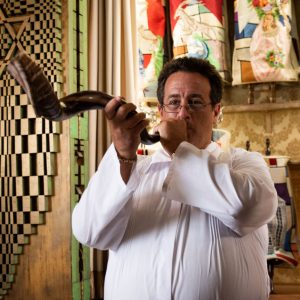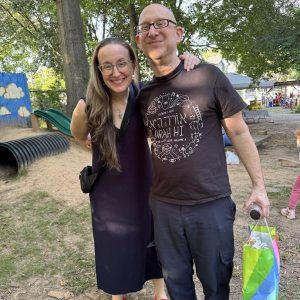VA'ETCHANAN – *SHABBAT NA'CHAMU 5779
A TIME FOR WEEPING AND A TIME FOR DANCING
14 Av 5779
August 16, 2019
When thou art in distress (ba'tzar l'cha) because all these things have befallen you… return to the LORD your God and obey Him… (Deuteronomy 4:30)
R. Johanon said in the name of R. Akiba: A "lesser" distress is one experienced by the individual but also shared by the community. Hence the Jewish proverb, "Others sharing in our sorrow provide a partial consolation." This insightful teaching highlights the blessing of family and friends who lovingly appear at our side during a personal crisis.
Reflect upon the dynamic in a Shiva house. The arrival of "consolers" provides the mourners with a lift; it lightens their burden. This doesn't make the pain disappear, but it lessens the sting. When at our side their presence imparts a modicum of strength during this crisis. We have all fulfilled the important mizvah (commandment) of comforting the mourner even as others have been at our side when we have, sadly, suffered a loss.
The mitzvah of bikkur cholim (visiting the sick) is a mandate to visit and to be helpful is helpful to the ill, the bed ridden and the home bound. Brief but sensitive visits help mitigate the loneliness and terror experienced by many seriously ill patients and their close families.
Comforting the mourner and visiting the ill are deemed acts of loving-kindness as is being with celebrants at their simcha. While the Talmud specifies participating in the joy of celebrating with a bride and groom and their families, a more expansive view is to extend ourselves to be with others as they celebrate significant milestones and events in their lives.
While not always convenient or even possible, the relevant question is, "Would you make the effort to be there if notified of illness, bereavement or other crises?" If so, why not extend yourself to be there for a happy occasion? "Even as "the presence of others sharing our sorrow is a partial consolation", the willingness of family and friends to share our joy adds to the quantity and quality of our simcha.
This past Sunday, in the annual Tisha b'Av Fast, we commemorated the destruction of both the First and Second Temples. Six days later in our liturgical calendar (this Friday) is Tu b'Av, the date set aside to celebrate marital love and the joys of marriage. It's our Tradition's way of integrating Ecclesiastes' wisdom, There is a time for weeping and a time for laughing, a time for wailing and time for dancing" (Ecclesiastes 3:3).
Being with others in good times and bad is time sensitive. The moment comes and the moment quickly goes: it is literally here today and gone tomorrow. May we be endowed with the inner strength and empathy to be with others in their dark and painful moments even as we are blessed with the good fortune to share many joyous occasion with loved ones and friends.
—
From the holy city of Jerusalem my best wishes for a Shabbat Shalom u'Mevorach – a Shabbat of peace and of blessing.
Rabbi Arnold M. Goodman
*On each of the seven Shabbatot immediately following Tisha b'Av the Haftara is a selection from the last chapters of the Book of Isaiah in which the prophet comforted the community that has suffered defeat at the hands of the Babylonians and was now in exile there. These selections are called the hafatorot of consolation. The haftara for this Shabbat begins with the words, "Nachamu nachamu ami. Comfort ye, comfort ye My People, sayeth your God" (Isaiah 40:1).
D'VARIM – SHABBAT HAZON 5779
CITIES BURNED WITH FIRE
August 8, 2019
7 Av 5779
The vision of Isaiah the son of Amoz… Hear O heavens and give ear O earth for the Lord has spoken… Your cities are burned with fire… [Isaiah 1: 1,2,7]
In the wake of El Paso and Dayton, Isaiah's lament in this prophetic portion, read on the Shabbat before Tisha B'Av, is powerfully and frighteningly relevant.
We feel besieged by lone gunmen, who terrorize, attack and murder in houses of worship, in schools, in shopping centers and in other venues. Following each tragedy, our leaders express solidarity with the survivors, stricken families and communities. Debates regarding gun-control are then at the top of our news cycles, accompanied by the usual hue and cry for effective control measures.
This past Saturday's tragedies again focused on the indoctrination of the perpetrators and would-be perpetrators by the tenets of white nationalism and white supremacy. It's a powerful mix that fuels the flames that threaten our safety and well-being.
D'varim, Hebrew for "words" can also be vocalized as d'vorim, (bees), and both bees and words are sources of both honey and stings. Thus, following each tragedy, leaders from all levels of government seek to soothe us with sweet words and promises of corrective action. Sadly, these honeyed words of assurance seldom succeed in moving the needle ever so slightly, and the conflict over the legality of gun ownership continues to imperil our safety.
Advocates of truly effective control measures continue to face push back from the NRA and its supporters of Second Amendment Rights. Yet, even were some control legislation be enacted, the reality is that the overabundance of guns in our midst would continue to threaten our overall safety.
There is, however, threatening speech that can and should be addressed: the inflammatory white nationalist and racist diatribes that are unceasingly spewed out from various social media outlets and resources. The disseminators of this hate speech, that demonizes and endangers segments of our population, claim the First Amendment protection of free speech. Yet even that cherished Amendment does not and should not protect speech that poses a clear and present danger to our overall safety and the common good. Might this, then, not be the moment to designate their words as a clear and present danger to our society and close down these platforms and outlets? It's a drastic step, but dousing the flames that engulf our cities requires admittedly drastic steps. Streams of sweet words and ongoing hand wringing will not lower, much less extinguish, the fire.
Saturday night and Sunday, we will observe the Fast of Tisha B'Av that commemorates the destruction of the First and Second Temples, the exile of our people from Eretz Yisrael and many other tragedies in Jewish history. While the return to Zion is today a reality, we are obviously acutely aware of the ongoing threats to Israel's survival, the revival of anti-Antisemitism, and the ongoing national and world threats to freedom and security.
Even as we are now mired down in a frightening contemporary Tisha B'Av moment, may we have the faith, the courage and the determination to move from sweet speech to tough action and begin the process of dousing the flames threatening and engulfing our cities.
—
From the holy city of Jerusalem, my best wishes for a Shabbat Shalom u'Mevorach – a Shabbat of peace and of blessing.
Rabbi Arnold M. Goodman






























